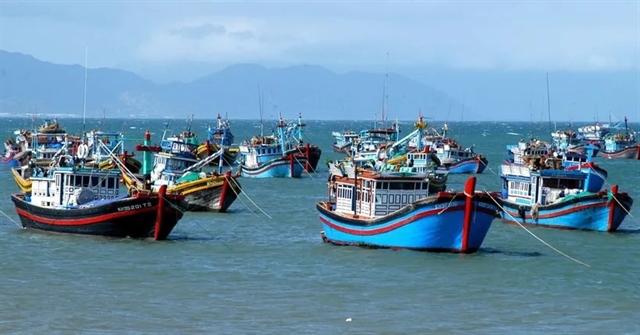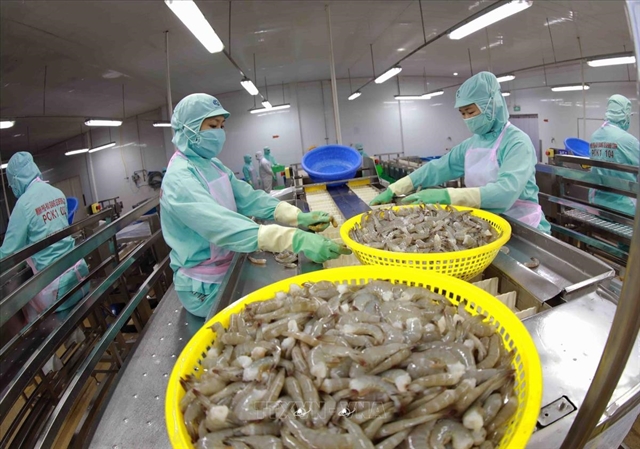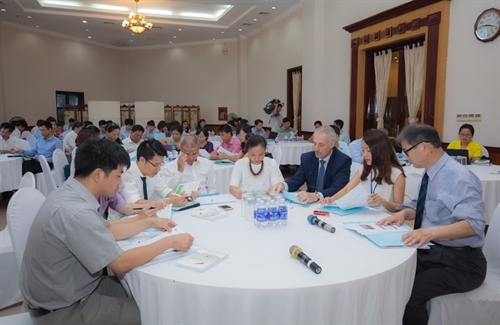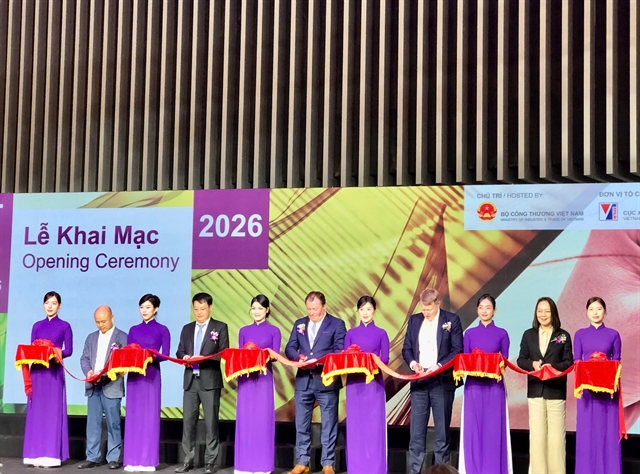 Society
Society

The European Union has allocated more than two million Euros for a project to scale up ethical biotrade initiatives within the phyto-pharmaceutical (plant-based) sector in Việt Nam.
 |
| Head of co-operation and development section of the EU delegation to Việt Nam, Alejandro Montalban,(third right) discusses the energy efficiency of value chains with project participants. — Photo Vũ Dũng |
HÀ NỘI — The European Union has allocated more than two million Euros for a project to scale up ethical biotrade initiatives within the phyto-pharmaceutical (plant-based) sector in Việt Nam.
The four-year project is being carried out jointly by HELVETAS Swiss Intercooperation, the National Institute of Medicinal Materials and the Centre for Rural Economy Development. It aims to improve the ability of at least 12 pharmaceutical businesses in Việt Nam to supply quality ethical biotrade (EBT) products to domestic and international markets.
Speaking at a seminar held in Hà Nội yesterday, Alejandro Montalban, head of cooperation and development section of the EU delegation to Việt Nam, said this project marked an important milestone in the promotion of a sustainable ethical biotrade business model within the natural ingredients sector of Việt Nam.
“We hope to see the goal of making Việt Nam an internationally recognised supplier of natural ingredients become visible and noticeable in the future,” Montalban said.
Nguyễn Lam Giang, country director for HELVETAS, said the project would also provide businesses with a clean and safe resource of medicinal herbs for their production and increase their competitiveness in domestic and international markets.
She said the project would involve some 5,000 smallholder farmers and relevant agencies of the Ministry of Health and the Ministry of Natural Resources and Environment.
“We expect the project will increase the income of farmers through support for effective implementation of ethical biotrade value chains, consolidation of knowledge and skills in cultivating, harvesting and collecting, as well as the processing of ingredients, all in a manner that respects biodiversity and environmental protection,” Giang said.
Giang said the project would contribute to scaling up of a policy framework under favourable conditions for biotrade initiatives to boost sustainable consumption and production development for the phyto-pharmaceutical sector in Việt Nam.
“The businesses that are taking part in the project would receive financial and technical support to apply and carry out the World Health Organisation’s Good Agricultural and Collection Practices (GACP) for EBT medicinal herbs,” Giang said.
Việt Nam’s abundant natural ingredients could serve as a source of raw materials for the pharmaceutical, cosmetic and food industries. However, the domestic supply has been dwindling due to overexploitation and lack of conservation. Manufacturers, as a consequence, have to import large quantities of raw materials of questionable quality from other countries. The national pharmaceutical sector, therefore, becomes vulnerable to foreign competition even in its own market, let alone enabling it to penetrate international markets.
Under the project, the businesses will develop new EBT value chains for up to 50 different medicinal and aromatic plants (MAPs). MAPs will be cultivated to reduce pressure on the natural habitats. Meanwhile, farmer groups will propagate and harvest MAPs sustainably and optimise conservation and economic returns of natural habitats.
The producer network will gradually grow to reach some 140 groups by the end of the project. This will generate new employment opportunities in uplands, add value to the raw materials and increase the energy efficiency of value chains.
Nguyễn Huy Văn, Deputy General Director of Traphaco Joint Stock Company, one of 12 businesses taking part in the project, said to Việt Nam News that using natural ingredients for pharmaceutical production was the current trend in the world.
“Joining in this project, which is association among farmers, State, businesses and scientists, will help us businesses have access to WHO standards, especially GACP for medicinal plants," said Văn.
He said businesses and farmers would be trained to change their medicinal plants growing process and receive counseling and support on processing facilities. Farmer groups, especially women, will be empowered by the new know-how, trained on green capital and introduced to financial institutes providing access to green capital.
HELVETAS says Việt Nam has more than 4,000 species which can be used as raw material; some 95 per cent of traditional Vietnamese remedies, including over 1,760 medicinal products, rely on this natural resource base.
The country produces up to 40,000 tonnes of raw medicinal material annually. In addition, significant quantities are imported from foreign countries, even though many of those plants species are available in Việt Nam.
Attending the seminar were also leaders of the ministries of health, agriculture and rural development, and industry and trade, in addition to representatives of the World Health Organisation, the United Nations Conference on Trade and Development, Vietnamese pharmaceutical businesses and partner localities. — VNS




